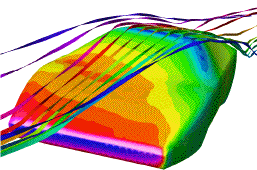15-853: Algorithms in the "Real World"
Carnegie Mellon University, Computer Science Department
Fall 2000

This page is superseded by the general course homepage.
- Instructors:
Guy Blelloch
and
Bruce Maggs
- Time: Tuesday and Thursday 1:30 - 2:50 (1st class Thursday Sept. 14)
- Place: 5409 Wean Hall
- Credit: 12 Units
- Prerequisites: An advanced undergrad course in algorithms
(15-451 or equivalent will suffice).
Course Overview:
Although all but the simplest algorithms are often derided as being
impractical, in reality sophisticated algorithms are used in many
applications. The goal of the class is to get an appreciation of
where algorithms are used and to understand the various considerations
and tradeoffs used in designing algorithms (e.g. time, space,
generality, and quality of the solution). I encourage both theory and
system's students to take the class. Problems we will consider
migh include:
Note:This year we will be including more topics to
do with the internet, including routing algorithms, error-correcting codes,
and web caching.
Requirements and Grading Criteria
We will spend 2 to 4 lectures on each topic. Each student will be
expected to complete a set of assignments, take the final, and help
either grade a homework or take scribe notes for one of the lectures.
SCRIBE NOTES AND GRADING
The scribe notes and granding will work as follows. We will be asking
for 2 or 3 volunteers to grade each assignment, and 2 volunteers to
take scribe notes for certain lectures (the ones that have not be
given in previous years). All students need to volunteer for ONE of
these two tasks during the semester.
TAKE HOME FINAL: The 48-hour take home final will be given out over
a period of 5 days starting Dec 12 (i.e. you can start any time during
the 5 day period, but must finish it within 48 hours of picking up the final.)
READINGS: Readings will vary from topic to topic and
you should look at the Readings, Notes and Slides
page to see what they are.
Grade partitioning:
Assignments
Relevant Books
See the lists within each of the topic pages
Help on giving presentations:
Guy Blelloch,
guyb@cs.cmu.edu.

